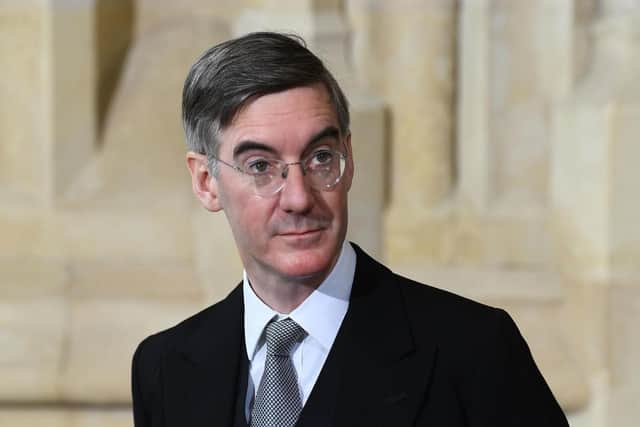Rees-Mogg's plan for MPs to form kilometre-long queue to vote 'is beyond farce'
Commons Leader Jacob Rees-Mogg tabled a motion today in Parliameent setting out the requirement preventing virtual voting from resuming.
If the House approves the plan tomorrow, then MPs may have to form a kilometre-long queue in order to obey social distancing rules if the majority of them vote.
Advertisement
Hide AdAdvertisement
Hide AdPressure group the Electoral Reform Society said the plans “risk leaving voters voiceless”. It said in a statement: “If this goes ahead, it is beyond a farce. It is unacceptable when there is currently a safe, secure and speedy option for voting available: remote/digital voting. MPs have already used it, and it works.
“Since some MPs are shielding and are not safe to travel in person, these plans - if confirmed - pose a real threat for democratic representation and political equality.”
The Government’s motion requires the need for voting in person at the Palace of Westminster and that MPs must follow Public Health England guidance.
The mechanics of voting would then be left down to Commons Speaker Sir Lindsay Hoyle to set out, with MPs having to avoid the narrow division lobbies.


Advertisement
Hide AdAdvertisement
Hide AdHe has described a single file of MPs snaking through Parliament as a “supermarket queue” that will lead through the centre of the chamber and to the dispatch box.
Writing on the PoliticsHome website, Mr Rees-Mogg said one of the advantages of returning to physical proceedings “is that the total numbers on the estate will not increase significantly”.
He wrote: “MPs’ staff will continue to work from home, while numbers will remain limited in the chamber itself so that its atmosphere remains muted for the time being. What is going to change is the quality of scrutiny.
“The virtual Parliament brought us through the peak of the pandemic but it is no longer necessary to make the compromises it demanded. We can do so much better.
Advertisement
Hide AdAdvertisement
Hide Ad“It comes down to the quality of communication between MPs and ministers. Politics is better done face-to-face, even if the whites of the ministerial eyes are six feet away.
“In the chamber frontbenchers will have to keep on their toes as interventions are once again made possible. This exceptional aspect of British democracy, curtailed under the hybrid halfway house, can once again flourish.”
The Conservative said the Government was working with the Commons authorities to see how MPs with underlying health conditions can contribute.
And he said the Commons would “not be returning to its normal hustle and bustle”, adding: “Those returning to Westminster for the first time in two months will be in for a surprise.
Advertisement
Hide AdAdvertisement
Hide Ad“The Palace has changed considerably, thanks to parliamentary officials’ thoroughness in ensuring the Commons adheres to public health advice. Social distancing is practised rigorously.
“The division lobbies are being replaced by a more appropriate alternative devised by the Speaker. Risk assessments are being conducted and the parliamentary estate will be Covid-19 secure.”
The Prime Minister's official spokesman added that MPs who need to shield "should continue to do so" and said that informal arrangements such as pairing would be in place to allow this.
The House of Lords is developing a new online voting system for peers expected to be ready by the middle of the month as the Government demands that MPs vote in person despite the coronavirus crisis.
Advertisement
Hide AdAdvertisement
Hide Ad"We're developing rapidly a brand new, secure online voting system for the House of Lords," a Lords spokesman said. "Peers will be able to vote at the touch of a smartphone screen or on a laptop or other device."
Legal advice from Thompsons Solicitors commissioned by Labour said the plans to scrap the virtual Parliament "would be likely to amount to discrimination" under equality laws if MPs were considered to be employees.
Ellie Reeves, Labour's shadow solicitor general, said: "These proposals are not only a risk to public health, but they also discriminate against MPs who are having to shield from the coronavirus and cannot safely return to work as usual."